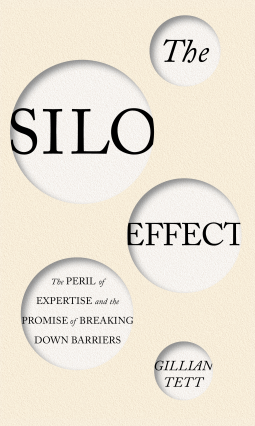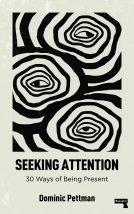
The Silo Effect
The Peril of Expertise and the Promise of Breaking Down Barriers
by Gillian Tett
This title was previously available on NetGalley and is now archived.
Buy on Amazon
Buy on BN.com
Buy on Bookshop.org
*This page contains affiliate links, so we may earn a small commission when you make a purchase through links on our site at no additional cost to you.
Send NetGalley books directly to your Kindle or Kindle app
1
To read on a Kindle or Kindle app, please add kindle@netgalley.com as an approved email address to receive files in your Amazon account. Click here for step-by-step instructions.
2
Also find your Kindle email address within your Amazon account, and enter it here.
Pub Date Sep 01 2015 | Archive Date Sep 01 2015
Description
From award-winning columnist and journalist Gillian Tett comes a brilliant examination of how our tendency to create functional departments—silos—hinders our work…and how some people and organizations can break those silos down to unleash innovation.
One of the characteristics of industrial age enterprises is that they are organized around functional departments. This organizational structure results in both limited information and restricted thinking. The Silo Effect asks these basic questions: why do humans working in modern institutions collectively act in ways that sometimes seem stupid? Why do normally clever people fail to see risks and opportunities that later seem blindingly obvious? Why, as psychologist Daniel Kahneman put it, are we sometimes so “blind to our own blindness”?
Gillian Tett, journalist and senior editor for the Financial Times, answers these questions by plumbing her background as an anthropologist and her experience reporting on the financial crisis in 2008. In The Silo Effect, she shares eight different tales of the silo syndrome, spanning Bloomberg’s City Hall in New York, the Bank of England in London, Cleveland Clinic hospital in Ohio, UBS bank in Switzerland, Facebook in San Francisco, Sony in Tokyo, the BlueMountain hedge fund, and the Chicago police. Some of these narratives illustrate how foolishly people can behave when they are mastered by silos. Others, however, show how institutions and individuals can master their silos instead. These are stories of failure and success.
From ideas about how to organize office spaces and lead teams of people with disparate expertise, Tett lays bare the silo effect and explains how people organize themselves, interact with each other, and imagine the world can take hold of an organization and lead from institutional blindness to 20/20 vision.
One of the characteristics of industrial age enterprises is that they are organized around functional departments. This organizational structure results in both limited information and restricted thinking. The Silo Effect asks these basic questions: why do humans working in modern institutions collectively act in ways that sometimes seem stupid? Why do normally clever people fail to see risks and opportunities that later seem blindingly obvious? Why, as psychologist Daniel Kahneman put it, are we sometimes so “blind to our own blindness”?
Gillian Tett, journalist and senior editor for the Financial Times, answers these questions by plumbing her background as an anthropologist and her experience reporting on the financial crisis in 2008. In The Silo Effect, she shares eight different tales of the silo syndrome, spanning Bloomberg’s City Hall in New York, the Bank of England in London, Cleveland Clinic hospital in Ohio, UBS bank in Switzerland, Facebook in San Francisco, Sony in Tokyo, the BlueMountain hedge fund, and the Chicago police. Some of these narratives illustrate how foolishly people can behave when they are mastered by silos. Others, however, show how institutions and individuals can master their silos instead. These are stories of failure and success.
From ideas about how to organize office spaces and lead teams of people with disparate expertise, Tett lays bare the silo effect and explains how people organize themselves, interact with each other, and imagine the world can take hold of an organization and lead from institutional blindness to 20/20 vision.
Available Editions
| EDITION | Other Format |
| ISBN | 9781451644739 |
| PRICE | $28.00 (USD) |
Average rating from 6 members
Readers who liked this book also liked:
That's Not How We Do It Here!
John Kotter; Holger Rathgeber
Business, Leadership, Finance, Nonfiction (Adult)
John Kotter; Holger Rathgeber
Business, Leadership, Finance, Nonfiction (Adult)
Seeking Attention
Dominic Pettman
Health, Mind & Body, Nonfiction (Adult), Politics & Current Affairs
Dominic Pettman
Health, Mind & Body, Nonfiction (Adult), Politics & Current Affairs












